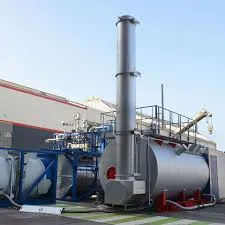
Sep . 24, 2024 07:58 Back to list
Evaluating the Efficiency of Hot Water Boilers for Optimal Performance and Energy Savings
Understanding Hot Water Boiler Efficiency
Hot water boilers are essential components in various heating systems, providing reliable warmth and comfort in residential and commercial buildings. The efficiency of a hot water boiler is a critical factor that directly impacts energy consumption, operational costs, and environmental sustainability. As energy prices rise and environmental concerns become more pressing, understanding boiler efficiency is paramount for homeowners and facility managers alike.
Boiler efficiency is typically measured in terms of its thermal efficiency, which indicates the percentage of energy contained in the fuel that is converted into usable heat. Higher efficiency ratings mean less fuel is needed to produce the same amount of heat, resulting in lower energy bills and reduced carbon emissions. In the market, modern hot water boilers can achieve efficiencies of 90% or more, thanks to advanced technologies such as condensing heat exchangers and improved insulation.
One crucial aspect to consider when evaluating hot water boiler efficiency is the type of fuel used. Boilers can be powered by natural gas, oil, electricity, or renewable sources like biomass. Each fuel type presents distinct advantages and efficiency levels. For example, gas boilers are generally known for their high efficiency and lower emissions compared to oil-fired systems. Conversely, electric boilers offer an efficient option but may incur higher operational costs depending on electricity prices in a given area.
hot water boiler efficiency

Maintenance also plays a significant role in maintaining optimal efficiency. Regular servicing, including the cleaning of burners and checking for heat loss, can ensure that the boiler operates at peak performance. It is recommended to adhere to a maintenance schedule, which can also extend the life expectancy of the system and prevent expensive repairs due to neglected components.
Moreover, improvements in technology have led to the introduction of smart controls that enhance boiler efficiency. These controls can adjust the boiler's operation based on real-time heating demands, thus reducing energy waste. They allow users to monitor and optimize their heating systems remotely, ensuring comfort without sacrificing efficiency.
In conclusion, hot water boiler efficiency is a critical consideration for those looking to improve energy consumption and reduce environmental impacts. By selecting the right fuel source, maintaining their systems adequately, and utilizing advanced technology, users can enjoy the benefits of efficient heating while contributing to a more sustainable future.
-
High Efficiency Gas Fired Thermal Oil Boiler for Industrial Heating
NewsJul.29,2025
-
High-Efficiency Gas Fired Hot Water Boiler for Sale – Reliable & Affordable
NewsJul.29,2025
-
High Efficiency Biomass Fired Hot Water Boiler for Industrial and Commercial Use
NewsJul.29,2025
-
High-Efficiency Biomass Fired Hot Water Boiler for Industrial Use
NewsJul.28,2025
-
High Efficiency Coal Fired Hot Water Boiler for Reliable Heating
NewsJul.28,2025
-
High Efficiency Coal Fired Thermal Oil Boiler for Industrial Heating
NewsJul.26,2025
Related PRODUCTS






















